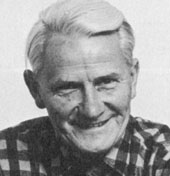Leslie Rees AM 1905 – 2000
- Home
- Leslie Rees AM 1905 – 2000
Leslie Rees AM 1905 – 2000

George Leslie Clarence Rees was born in Perth, Western Australia, on 28 December 1905.
In 1929 a travelling scholarship took him to London.
In London, Rees worked as senior drama critic on The Era, a weekly theatrical paper.
In 1938 Rees founded the Playwrights’ Advisory Board.
Australian vision
of Australian plays being written for an Australian theatre in the Australian vernacular is taken for granted, but in Rees’ youth in the 1920s no such theatre existed. Australians were entertained on a diet of British and American imports, and the idea that Australian history and the ordinary, everyday lives of Australians might be fit subjects for the Australian stage was unimaginable. Rees, however, saw theatre as an art form that, by its very nature, showed us who we were. Until the Australian theatre found its own voice, expressing its own ethos and values, Rees felt, we would remain exactly what our theatre was showing us we were: a second-rate, imitative, grovelling, colonial culture of amateurs subsisting on a diet of imports.’
Leslie Rees wore many hats. He was an author, playwright, critic, theatre historian and editor of radio drama for the ABC, but it was as an advocate for Australian drama that he made his greatest contribution.
George Leslie Clarence Rees was born in Perth, Western Australia, on 28 December 1905. He worked as a reporter on The West Australian while he studied for an Arts degree at the University of Western Australia, and edited The Black Swan, the campus’ literary quarterly. In 1929 a travelling scholarship took him to London. There, two years later, he married Coralie Clarke, who had been his assistant editor on The Black Swan.
In London, Rees worked as senior drama critic on The Era, a weekly theatrical paper. He and his wife returned to Australia in 1936. Rees was appointed ABC drama editor later that year. During his 30-year tenure he encouraged local playwrights to submit original scripts, and soon developed a dynamic pool of talent including Max Afford, Edmund Barclay, Richard Lane, Catherine Duncan, Gwen Meredith, and many more. As well, he had plays by established dramatists such as Dymphna Cusack and Betty Roland adapted for radio. In 1941 he was instrumental in having The Fire on the Snow, Douglas Stewart’s brilliant verse play about Scott’s South Pole disaster, presented on radio. An instant classic, it has been re-broadcast many times and has been successfully transferred to the stage.
I n 1938 Rees founded the Playwrights’ Advisory Board, which was dedicated to the promotion of the interests of Australian dramatists. Their scripts were assessed, critiqued, and circulated to possible producers. In the Board’s 25-year history, around 260 productions were facilitated – including Ray Lawler’s Summer of the Seventeenth Doll – and 17 were published. Rees was the Board’s chairman throughout its existence. ‘He was like an oasis in the wilderness,’ said scriptwriter and playwright Eleanor Witcombe. ‘You must understand, there was no theatre then, none. Absolutely none! You just couldn’t write about any Australian subjects at all. There was no prestige about writing plays about Australia, and when we did start to do it, our writing was extremely tentative. You see, we were unsure of ourselves. We had been put down so often and we had no one to help us through, tell us how we were doing. Leslie was one of the very few people around who would help us with the actual process of writing… The place was like a wilderness.’
Rees’ own plays included Sub-Editor’s Room, a one-acter produced by Sydney New Theatre in the 1930s (it later had the distinction of being the first Australian play performed on television); Lalor of Eureka, which won a 1939 Melbourne New Theatre competition; and an adaptation of Ruth Park’s Harp in the South, in collaboration with the author. Rees also wrote many books for children; the tale of Digit Dick, ‘the boy as big as his mother’s toe’, was probably the most popular. His bush stories teem with enchanting characters like Shy the Platypus and Karrawingi the Emu.
But it was as a documenter of the drama that Rees made his most remarkable contribution: three indispensable chronicles of Australian theatre history. The first, Towards an Australian Drama, was published in 1953. In 1987 this was revised and expanded to become the two-volume A History of Australian Drama. Rees’s own memoirs, Hold Fast to Dreams, were published in 1982.
In 1981, in recognition of his ‘services to literature’, Leslie Rees was made a member of the Order of Australia. In 1999 he was honoured with a special award in the NSW Premier’s Literary Awards for his unparalleled contribution to the Australian theatre and writing: ‘He has pursued excellence,’ read the citation. ‘He has held on fast to ideals and visions, he has pursued his dream for an Australian drama with an aggressively, recognisably Australian vision, a love of the country and a firm set of ideals.’
Leslie Rees died on 17 August 2000. He was 94.
Frank Van Straten, 2007
Related Links
References
Biographical
Angela Bennie: ‘Leslie Rees’, in The Sydney Morning Herald, 17 August 2000
Richard Lane: ‘Leslie Rees AM’, in Companion to Theatre in AustraliaCurrency Press, 1995
Richard Lane: ‘Playwrights’ Advisory Board’, in Companion to Theatre in Australia, Currency Press, 1995
Richard Lane: ‘Leslie Rees’, in The Golden Age of Australian Radio Drama, Melbourne University Press, 1994
Leslie Rees: Hold Fast to Dreams. Alternative Publishing Co-operative, 1982
Leslie Rees: Towards an Australian Drama, Angus and Robertson, 1953
L eslie Rees: A History of Australian Drama, two volumes, Angus and Robertson, 1987